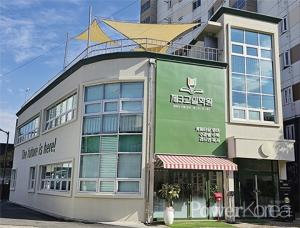 |
||
Great Monk Seongcheol asked one thing to anyone visiting where he was: three thousand bows. No exception for old or ill. Bowing, he said, means lowering oneself and the heart. Through this, the one faces the trueself. Keeping the Baek Ryeon Temple, monk Wontaek made these three thousand bows as the tradition of the temple. Wontaek also is the keeper of Gup Oe Temple in Sancheong County where traces of Great Monk Seongcheol still live.
Seongcheol ate rice with grits without complaint, made a model for collective spirit, emphasized the nature of Buddha in all living things poor or rich, and passionately carried out self-training through meditation.
Seongcheol
Seongcheol was born in 1912. A story goes that he learned Zizhi Tongjian, written by Sima Guang and published in 1084 AD, in his early years, mastered the secrets of learning and did not need to learn more ever since.
He read ancient books oriental or western extensively with a question ‘from eternity to eternity’ but could not find the answer. One day, he met an old monk who handed him Jeungdoga, a book of monk Younga, read it and was enlightened.
He went to Daewon Temple in Jiri Mountain and trained himself for 40 days and left home in 1936. He went to Haein Temple and trained under monk Hadongsan and received Buddhist precepts from monk Woonbong at Beomeo Temple in Busan the next year.
In 1940, age 29, he recited poems of enlightenment at Geumdang Buddhist Institute in Daegu and in 1947 declared his motto ‘live like Buddha’ at Bongam Temple in Mungyeong. The order and manners of the Jogye Order of the Korean Buddhism was built on this motto.
When the Korean War broke out, he lived in an underground tunnel in a valley of Tongyeong City. He was called to serve as the first chief monk of Haein Temple in 1955 but went to Seongjeon Temple in Palgong Mountain, Daegu, instead, fenced the temple with wire mesh, carried out meditation for 8 years and established unique Buddhist theories and practices.
In 1964, he and monk Chungdam opened Sildal Institute and in 1967, inaugurated as the head of Haeinchongrim in Haein Temple and introduced the famous ‘100 Day Buddhist Priesthood’ which laid its foundation on ‘the middle way’. After 18 years of serving the head, he was chaired the 7th chief monk of the Jogye Order in 1981.
He was a role model for nonpossession and frugality and asked followers to know oneself first and to pray for others and all living things. November 1933, he left his last word ‘train hard’ and fell into the big silence. He was 82.
Wontaek
Gup Oe Temple in Sancheong County is where Seongcheol’s birthplace is. Seongcheol’s only family monk Bulpil built Gup Oe Temple in 2001 with help of Wontaek and it is one of the 15 temples with traces of Seongcheol.
Gup Oe means ‘out of time and space’ and it was the name Seongcheol gave to his stay in Busan. The 18 pillars greet visitors first followed by a big garden with a statue of Seongcheol in the middle. The main building is on the left side of the statue and the portrait of Seongcheol painted by Kim Ho-suk is hung on the wall. Behind the statue is a recovered birthplace of Seongcheol where he had lived until 25 under the name Lee Young-ju before leaving for good. Relics of him are displayed in the memorial hall and the guesthouse.
As a pupil of Seongcheol, Wontaek has served no one but him. He majored in political science and diplomacy at Yeonsei University. One day, his friend asked him to travel down to Haein Temple to see the great monk there. Wontake never knew it would change his life forever.
“Why don’t you be a monk? I had this feeling you will do very well” said Seongcheol. Wontaek doubted about this at first and thought leaving his family was horrible thing to do. Next day, however, he started to feel that leaving his family wasn’t that horrible a thing to do and he started assisting Seongcheol ever since.
Finding meditation difficult for him, he listened and wrote the teachings of his teacher instead for 4 years. The record was made into books with help of another Great Monk of the time Bopjong.
“I thought it my job of life to record teachings of Seongcheol for the people now and after as a man who have watched him closely for a long time.”
Wontaek opened the Seongcheol Memorial Hall in 2015 and is running the Baek Ryeon Buddhist Culture Foundation to spread his teachings to the people. He is also serving as the head of the Jorgye Order National Community Promotion Headquarters.
김태인 기자 red3955@hanmail.net






